Analysis of Mental Health Worker: Human Service Profession Development
VerifiedAdded on 2022/08/14
|9
|2191
|12
Essay
AI Summary
This essay delves into the multifaceted role of mental health workers as human service professionals, exploring their responsibilities in assessing, diagnosing, and treating psychological and behavioral dysfunctions. It examines the historical development of the profession, highlighting key moments and significant changes, including the shift towards the biopsychosocial model and the growing importance of mental health support in society. The essay analyzes the roles of various mental health workers, such as psychologists, psychiatrists, and social workers, and discusses the legal implications and regulations governing their practice, including professional indemnity insurance, HCPC registration, and the Equality Act 2010. It also addresses the evolution of mental health services from hospital-based care to community-based approaches, and the impact of policies and legislation on the profession, such as the NHS Long Term plan and the Mental Health Act amendments. The essay emphasizes the importance of continued training, ethical conduct, and a patient-centered approach in mental healthcare.
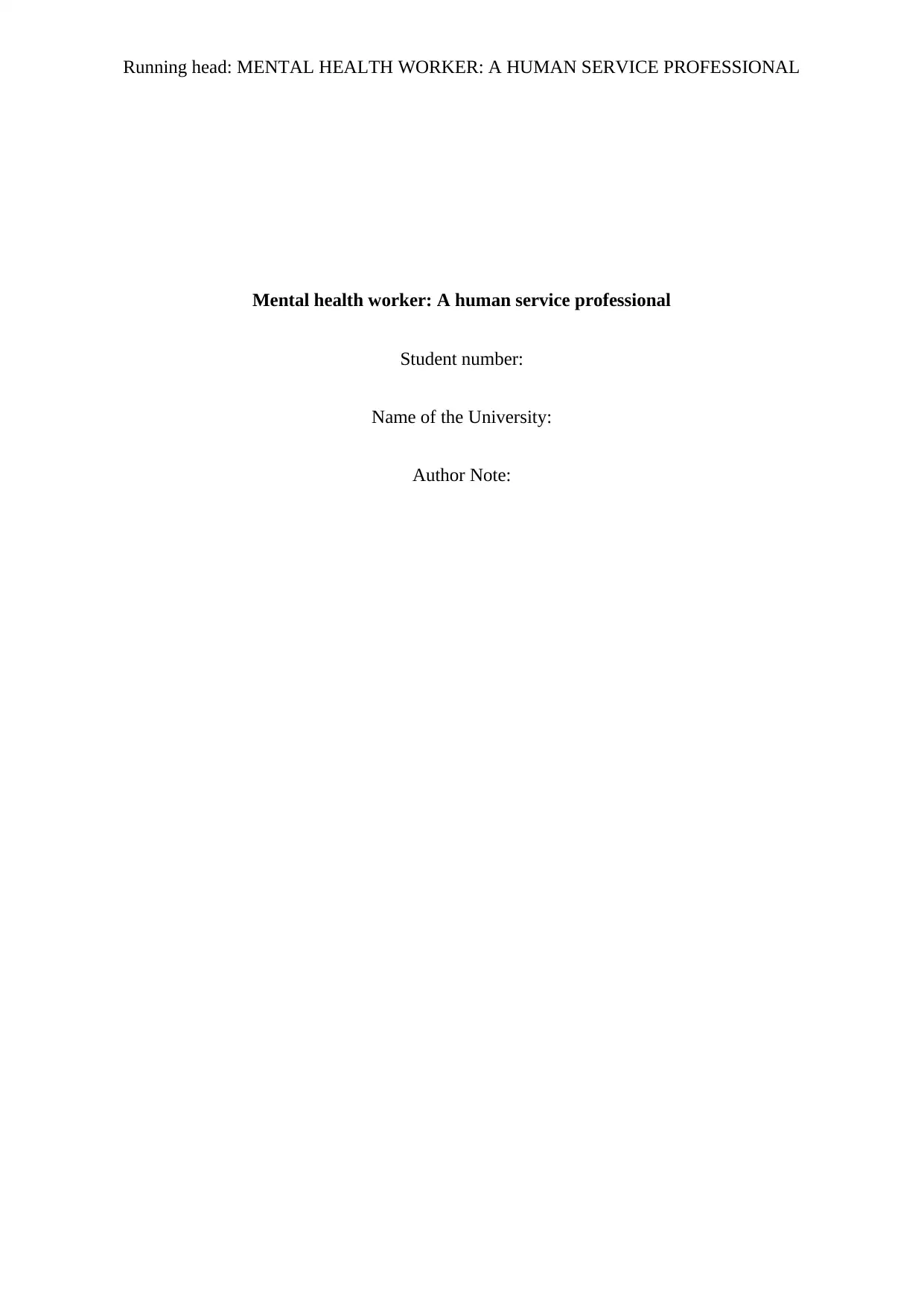
Running head: MENTAL HEALTH WORKER: A HUMAN SERVICE PROFESSIONAL
Mental health worker: A human service professional
Student number:
Name of the University:
Author Note:
Mental health worker: A human service professional
Student number:
Name of the University:
Author Note:
Paraphrase This Document
Need a fresh take? Get an instant paraphrase of this document with our AI Paraphraser
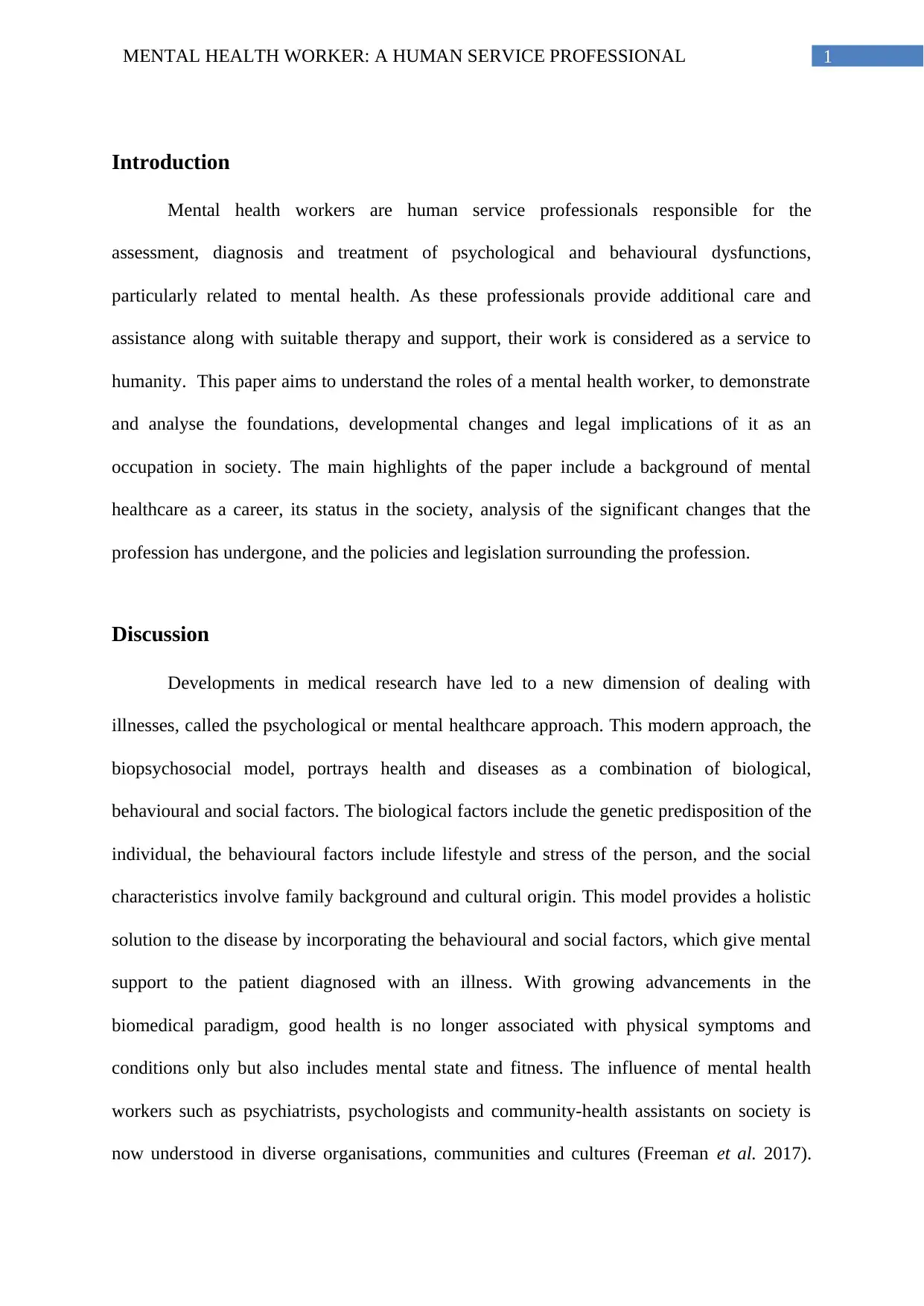
1MENTAL HEALTH WORKER: A HUMAN SERVICE PROFESSIONAL
Introduction
Mental health workers are human service professionals responsible for the
assessment, diagnosis and treatment of psychological and behavioural dysfunctions,
particularly related to mental health. As these professionals provide additional care and
assistance along with suitable therapy and support, their work is considered as a service to
humanity. This paper aims to understand the roles of a mental health worker, to demonstrate
and analyse the foundations, developmental changes and legal implications of it as an
occupation in society. The main highlights of the paper include a background of mental
healthcare as a career, its status in the society, analysis of the significant changes that the
profession has undergone, and the policies and legislation surrounding the profession.
Discussion
Developments in medical research have led to a new dimension of dealing with
illnesses, called the psychological or mental healthcare approach. This modern approach, the
biopsychosocial model, portrays health and diseases as a combination of biological,
behavioural and social factors. The biological factors include the genetic predisposition of the
individual, the behavioural factors include lifestyle and stress of the person, and the social
characteristics involve family background and cultural origin. This model provides a holistic
solution to the disease by incorporating the behavioural and social factors, which give mental
support to the patient diagnosed with an illness. With growing advancements in the
biomedical paradigm, good health is no longer associated with physical symptoms and
conditions only but also includes mental state and fitness. The influence of mental health
workers such as psychiatrists, psychologists and community-health assistants on society is
now understood in diverse organisations, communities and cultures (Freeman et al. 2017).
Introduction
Mental health workers are human service professionals responsible for the
assessment, diagnosis and treatment of psychological and behavioural dysfunctions,
particularly related to mental health. As these professionals provide additional care and
assistance along with suitable therapy and support, their work is considered as a service to
humanity. This paper aims to understand the roles of a mental health worker, to demonstrate
and analyse the foundations, developmental changes and legal implications of it as an
occupation in society. The main highlights of the paper include a background of mental
healthcare as a career, its status in the society, analysis of the significant changes that the
profession has undergone, and the policies and legislation surrounding the profession.
Discussion
Developments in medical research have led to a new dimension of dealing with
illnesses, called the psychological or mental healthcare approach. This modern approach, the
biopsychosocial model, portrays health and diseases as a combination of biological,
behavioural and social factors. The biological factors include the genetic predisposition of the
individual, the behavioural factors include lifestyle and stress of the person, and the social
characteristics involve family background and cultural origin. This model provides a holistic
solution to the disease by incorporating the behavioural and social factors, which give mental
support to the patient diagnosed with an illness. With growing advancements in the
biomedical paradigm, good health is no longer associated with physical symptoms and
conditions only but also includes mental state and fitness. The influence of mental health
workers such as psychiatrists, psychologists and community-health assistants on society is
now understood in diverse organisations, communities and cultures (Freeman et al. 2017).
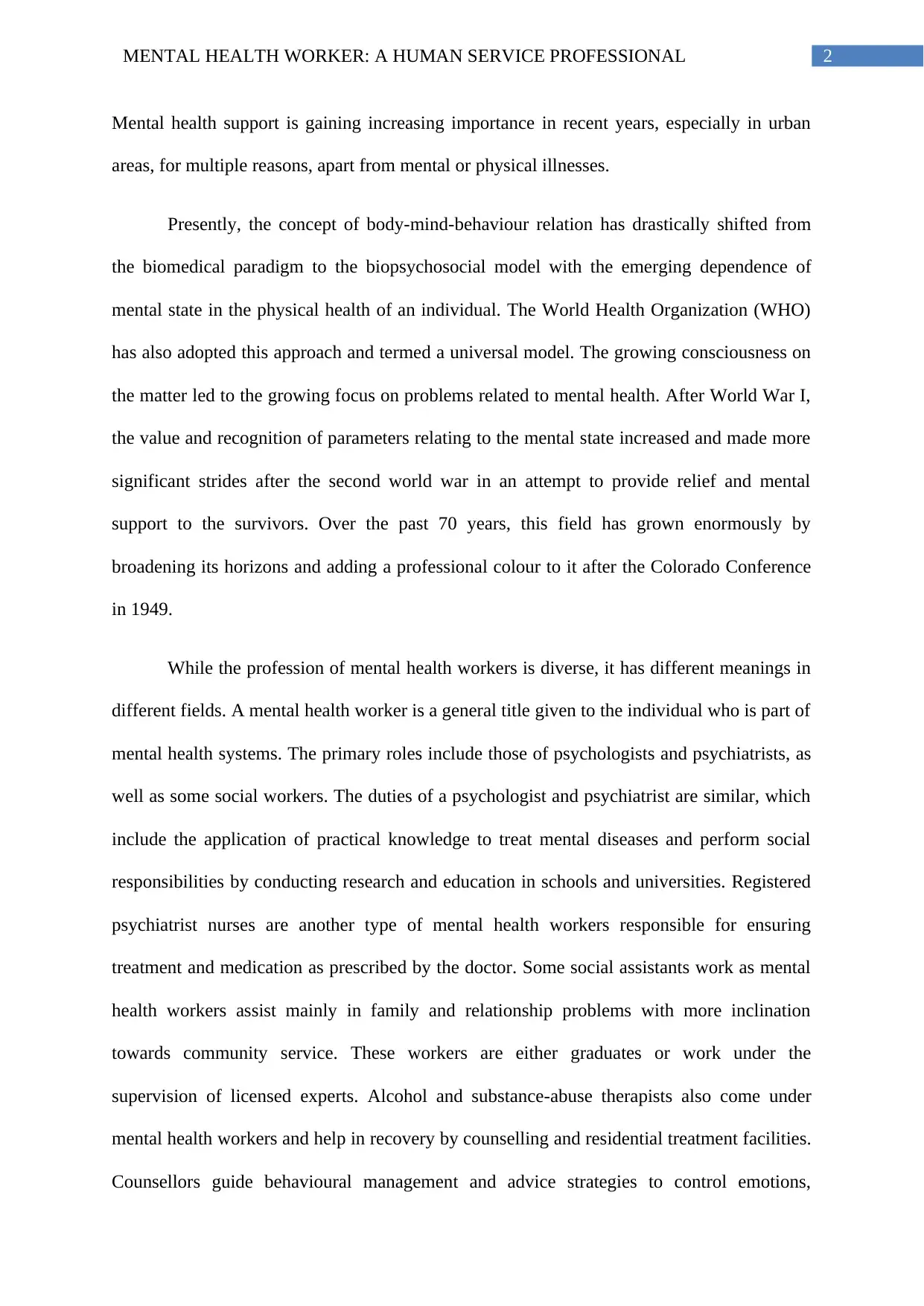
2MENTAL HEALTH WORKER: A HUMAN SERVICE PROFESSIONAL
Mental health support is gaining increasing importance in recent years, especially in urban
areas, for multiple reasons, apart from mental or physical illnesses.
Presently, the concept of body-mind-behaviour relation has drastically shifted from
the biomedical paradigm to the biopsychosocial model with the emerging dependence of
mental state in the physical health of an individual. The World Health Organization (WHO)
has also adopted this approach and termed a universal model. The growing consciousness on
the matter led to the growing focus on problems related to mental health. After World War I,
the value and recognition of parameters relating to the mental state increased and made more
significant strides after the second world war in an attempt to provide relief and mental
support to the survivors. Over the past 70 years, this field has grown enormously by
broadening its horizons and adding a professional colour to it after the Colorado Conference
in 1949.
While the profession of mental health workers is diverse, it has different meanings in
different fields. A mental health worker is a general title given to the individual who is part of
mental health systems. The primary roles include those of psychologists and psychiatrists, as
well as some social workers. The duties of a psychologist and psychiatrist are similar, which
include the application of practical knowledge to treat mental diseases and perform social
responsibilities by conducting research and education in schools and universities. Registered
psychiatrist nurses are another type of mental health workers responsible for ensuring
treatment and medication as prescribed by the doctor. Some social assistants work as mental
health workers assist mainly in family and relationship problems with more inclination
towards community service. These workers are either graduates or work under the
supervision of licensed experts. Alcohol and substance-abuse therapists also come under
mental health workers and help in recovery by counselling and residential treatment facilities.
Counsellors guide behavioural management and advice strategies to control emotions,
Mental health support is gaining increasing importance in recent years, especially in urban
areas, for multiple reasons, apart from mental or physical illnesses.
Presently, the concept of body-mind-behaviour relation has drastically shifted from
the biomedical paradigm to the biopsychosocial model with the emerging dependence of
mental state in the physical health of an individual. The World Health Organization (WHO)
has also adopted this approach and termed a universal model. The growing consciousness on
the matter led to the growing focus on problems related to mental health. After World War I,
the value and recognition of parameters relating to the mental state increased and made more
significant strides after the second world war in an attempt to provide relief and mental
support to the survivors. Over the past 70 years, this field has grown enormously by
broadening its horizons and adding a professional colour to it after the Colorado Conference
in 1949.
While the profession of mental health workers is diverse, it has different meanings in
different fields. A mental health worker is a general title given to the individual who is part of
mental health systems. The primary roles include those of psychologists and psychiatrists, as
well as some social workers. The duties of a psychologist and psychiatrist are similar, which
include the application of practical knowledge to treat mental diseases and perform social
responsibilities by conducting research and education in schools and universities. Registered
psychiatrist nurses are another type of mental health workers responsible for ensuring
treatment and medication as prescribed by the doctor. Some social assistants work as mental
health workers assist mainly in family and relationship problems with more inclination
towards community service. These workers are either graduates or work under the
supervision of licensed experts. Alcohol and substance-abuse therapists also come under
mental health workers and help in recovery by counselling and residential treatment facilities.
Counsellors guide behavioural management and advice strategies to control emotions,
⊘ This is a preview!⊘
Do you want full access?
Subscribe today to unlock all pages.

Trusted by 1+ million students worldwide
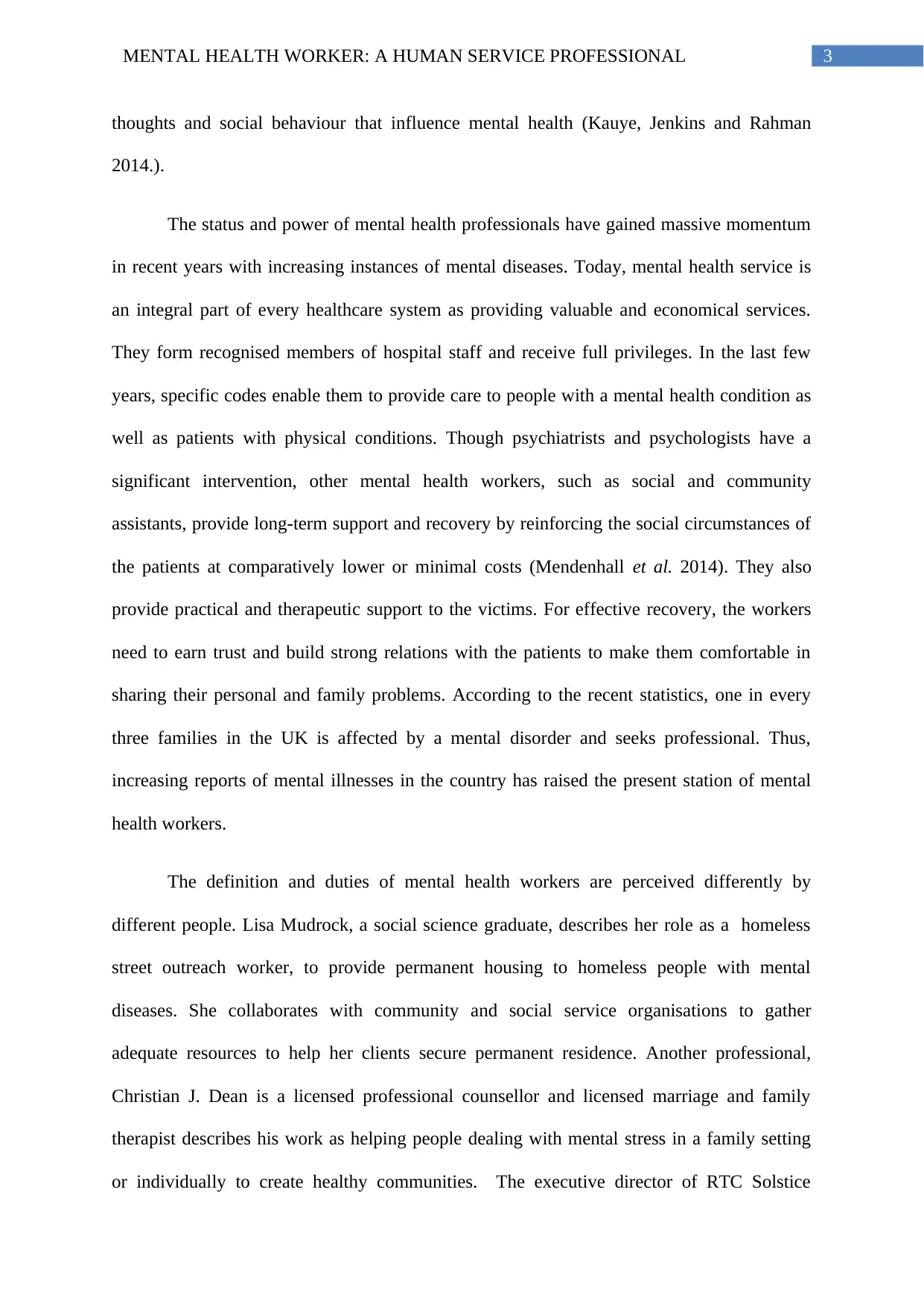
3MENTAL HEALTH WORKER: A HUMAN SERVICE PROFESSIONAL
thoughts and social behaviour that influence mental health (Kauye, Jenkins and Rahman
2014.).
The status and power of mental health professionals have gained massive momentum
in recent years with increasing instances of mental diseases. Today, mental health service is
an integral part of every healthcare system as providing valuable and economical services.
They form recognised members of hospital staff and receive full privileges. In the last few
years, specific codes enable them to provide care to people with a mental health condition as
well as patients with physical conditions. Though psychiatrists and psychologists have a
significant intervention, other mental health workers, such as social and community
assistants, provide long-term support and recovery by reinforcing the social circumstances of
the patients at comparatively lower or minimal costs (Mendenhall et al. 2014). They also
provide practical and therapeutic support to the victims. For effective recovery, the workers
need to earn trust and build strong relations with the patients to make them comfortable in
sharing their personal and family problems. According to the recent statistics, one in every
three families in the UK is affected by a mental disorder and seeks professional. Thus,
increasing reports of mental illnesses in the country has raised the present station of mental
health workers.
The definition and duties of mental health workers are perceived differently by
different people. Lisa Mudrock, a social science graduate, describes her role as a homeless
street outreach worker, to provide permanent housing to homeless people with mental
diseases. She collaborates with community and social service organisations to gather
adequate resources to help her clients secure permanent residence. Another professional,
Christian J. Dean is a licensed professional counsellor and licensed marriage and family
therapist describes his work as helping people dealing with mental stress in a family setting
or individually to create healthy communities. The executive director of RTC Solstice
thoughts and social behaviour that influence mental health (Kauye, Jenkins and Rahman
2014.).
The status and power of mental health professionals have gained massive momentum
in recent years with increasing instances of mental diseases. Today, mental health service is
an integral part of every healthcare system as providing valuable and economical services.
They form recognised members of hospital staff and receive full privileges. In the last few
years, specific codes enable them to provide care to people with a mental health condition as
well as patients with physical conditions. Though psychiatrists and psychologists have a
significant intervention, other mental health workers, such as social and community
assistants, provide long-term support and recovery by reinforcing the social circumstances of
the patients at comparatively lower or minimal costs (Mendenhall et al. 2014). They also
provide practical and therapeutic support to the victims. For effective recovery, the workers
need to earn trust and build strong relations with the patients to make them comfortable in
sharing their personal and family problems. According to the recent statistics, one in every
three families in the UK is affected by a mental disorder and seeks professional. Thus,
increasing reports of mental illnesses in the country has raised the present station of mental
health workers.
The definition and duties of mental health workers are perceived differently by
different people. Lisa Mudrock, a social science graduate, describes her role as a homeless
street outreach worker, to provide permanent housing to homeless people with mental
diseases. She collaborates with community and social service organisations to gather
adequate resources to help her clients secure permanent residence. Another professional,
Christian J. Dean is a licensed professional counsellor and licensed marriage and family
therapist describes his work as helping people dealing with mental stress in a family setting
or individually to create healthy communities. The executive director of RTC Solstice
Paraphrase This Document
Need a fresh take? Get an instant paraphrase of this document with our AI Paraphraser
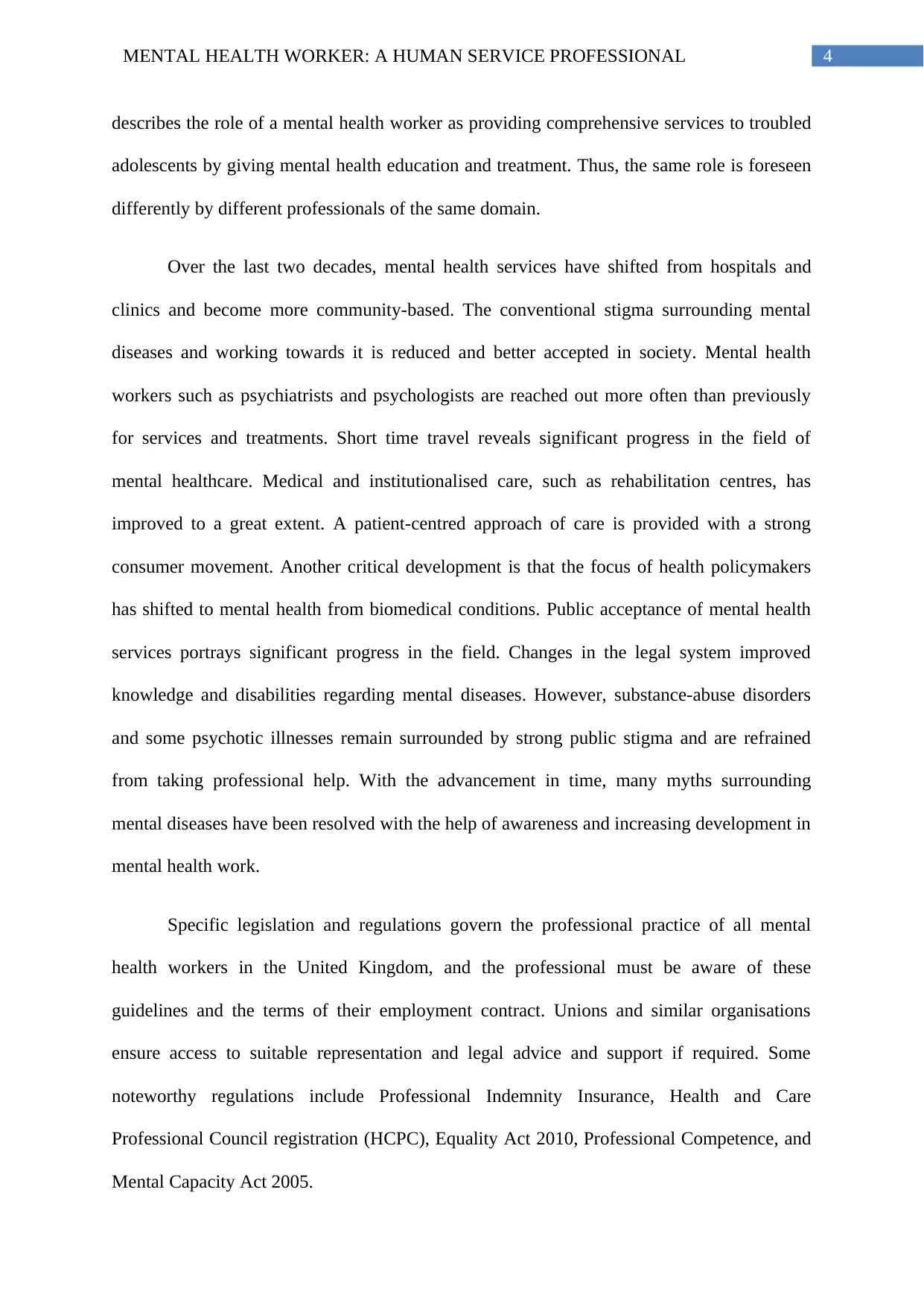
4MENTAL HEALTH WORKER: A HUMAN SERVICE PROFESSIONAL
describes the role of a mental health worker as providing comprehensive services to troubled
adolescents by giving mental health education and treatment. Thus, the same role is foreseen
differently by different professionals of the same domain.
Over the last two decades, mental health services have shifted from hospitals and
clinics and become more community-based. The conventional stigma surrounding mental
diseases and working towards it is reduced and better accepted in society. Mental health
workers such as psychiatrists and psychologists are reached out more often than previously
for services and treatments. Short time travel reveals significant progress in the field of
mental healthcare. Medical and institutionalised care, such as rehabilitation centres, has
improved to a great extent. A patient-centred approach of care is provided with a strong
consumer movement. Another critical development is that the focus of health policymakers
has shifted to mental health from biomedical conditions. Public acceptance of mental health
services portrays significant progress in the field. Changes in the legal system improved
knowledge and disabilities regarding mental diseases. However, substance-abuse disorders
and some psychotic illnesses remain surrounded by strong public stigma and are refrained
from taking professional help. With the advancement in time, many myths surrounding
mental diseases have been resolved with the help of awareness and increasing development in
mental health work.
Specific legislation and regulations govern the professional practice of all mental
health workers in the United Kingdom, and the professional must be aware of these
guidelines and the terms of their employment contract. Unions and similar organisations
ensure access to suitable representation and legal advice and support if required. Some
noteworthy regulations include Professional Indemnity Insurance, Health and Care
Professional Council registration (HCPC), Equality Act 2010, Professional Competence, and
Mental Capacity Act 2005.
describes the role of a mental health worker as providing comprehensive services to troubled
adolescents by giving mental health education and treatment. Thus, the same role is foreseen
differently by different professionals of the same domain.
Over the last two decades, mental health services have shifted from hospitals and
clinics and become more community-based. The conventional stigma surrounding mental
diseases and working towards it is reduced and better accepted in society. Mental health
workers such as psychiatrists and psychologists are reached out more often than previously
for services and treatments. Short time travel reveals significant progress in the field of
mental healthcare. Medical and institutionalised care, such as rehabilitation centres, has
improved to a great extent. A patient-centred approach of care is provided with a strong
consumer movement. Another critical development is that the focus of health policymakers
has shifted to mental health from biomedical conditions. Public acceptance of mental health
services portrays significant progress in the field. Changes in the legal system improved
knowledge and disabilities regarding mental diseases. However, substance-abuse disorders
and some psychotic illnesses remain surrounded by strong public stigma and are refrained
from taking professional help. With the advancement in time, many myths surrounding
mental diseases have been resolved with the help of awareness and increasing development in
mental health work.
Specific legislation and regulations govern the professional practice of all mental
health workers in the United Kingdom, and the professional must be aware of these
guidelines and the terms of their employment contract. Unions and similar organisations
ensure access to suitable representation and legal advice and support if required. Some
noteworthy regulations include Professional Indemnity Insurance, Health and Care
Professional Council registration (HCPC), Equality Act 2010, Professional Competence, and
Mental Capacity Act 2005.
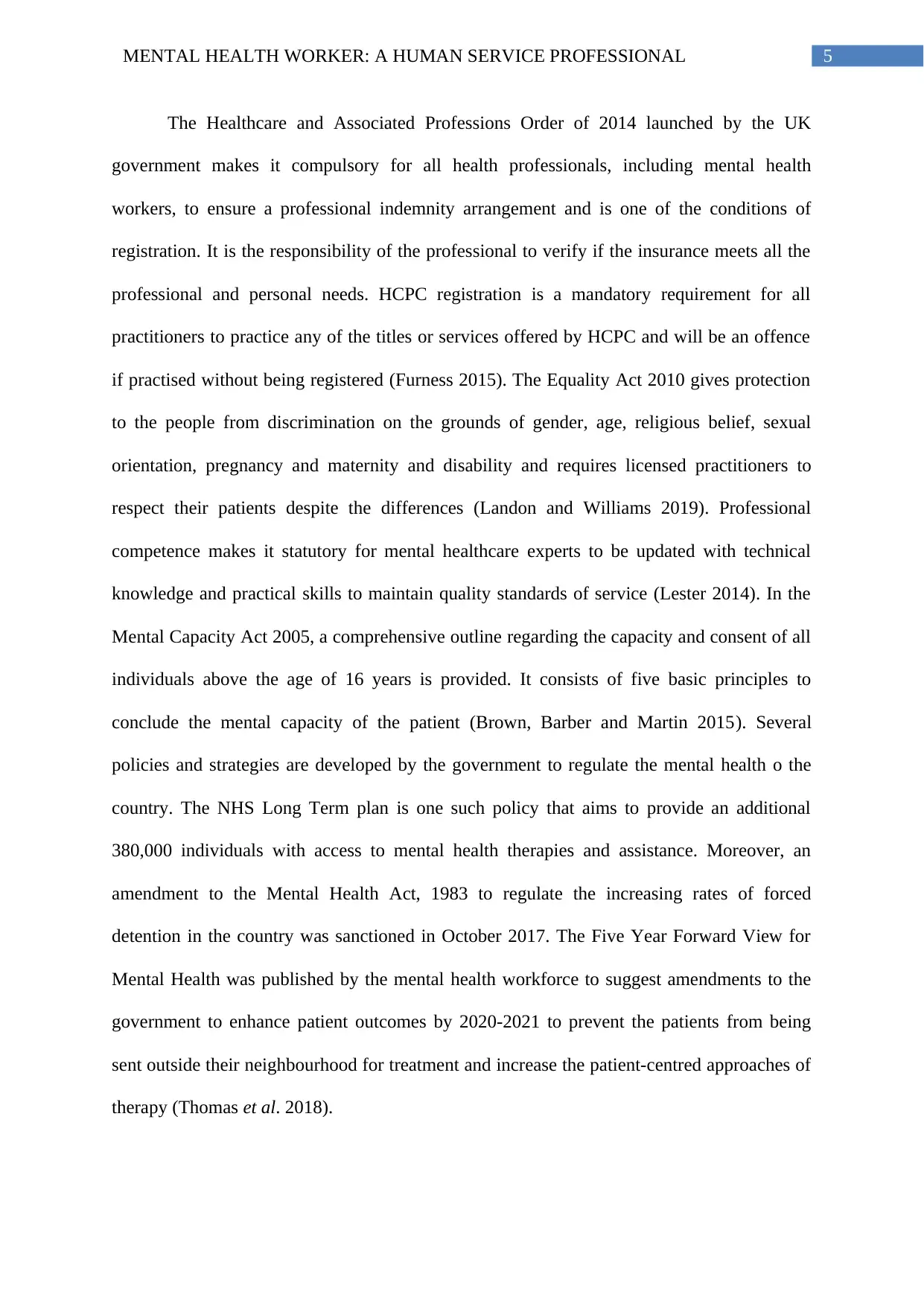
5MENTAL HEALTH WORKER: A HUMAN SERVICE PROFESSIONAL
The Healthcare and Associated Professions Order of 2014 launched by the UK
government makes it compulsory for all health professionals, including mental health
workers, to ensure a professional indemnity arrangement and is one of the conditions of
registration. It is the responsibility of the professional to verify if the insurance meets all the
professional and personal needs. HCPC registration is a mandatory requirement for all
practitioners to practice any of the titles or services offered by HCPC and will be an offence
if practised without being registered (Furness 2015). The Equality Act 2010 gives protection
to the people from discrimination on the grounds of gender, age, religious belief, sexual
orientation, pregnancy and maternity and disability and requires licensed practitioners to
respect their patients despite the differences (Landon and Williams 2019). Professional
competence makes it statutory for mental healthcare experts to be updated with technical
knowledge and practical skills to maintain quality standards of service (Lester 2014). In the
Mental Capacity Act 2005, a comprehensive outline regarding the capacity and consent of all
individuals above the age of 16 years is provided. It consists of five basic principles to
conclude the mental capacity of the patient (Brown, Barber and Martin 2015). Several
policies and strategies are developed by the government to regulate the mental health o the
country. The NHS Long Term plan is one such policy that aims to provide an additional
380,000 individuals with access to mental health therapies and assistance. Moreover, an
amendment to the Mental Health Act, 1983 to regulate the increasing rates of forced
detention in the country was sanctioned in October 2017. The Five Year Forward View for
Mental Health was published by the mental health workforce to suggest amendments to the
government to enhance patient outcomes by 2020-2021 to prevent the patients from being
sent outside their neighbourhood for treatment and increase the patient-centred approaches of
therapy (Thomas et al. 2018).
The Healthcare and Associated Professions Order of 2014 launched by the UK
government makes it compulsory for all health professionals, including mental health
workers, to ensure a professional indemnity arrangement and is one of the conditions of
registration. It is the responsibility of the professional to verify if the insurance meets all the
professional and personal needs. HCPC registration is a mandatory requirement for all
practitioners to practice any of the titles or services offered by HCPC and will be an offence
if practised without being registered (Furness 2015). The Equality Act 2010 gives protection
to the people from discrimination on the grounds of gender, age, religious belief, sexual
orientation, pregnancy and maternity and disability and requires licensed practitioners to
respect their patients despite the differences (Landon and Williams 2019). Professional
competence makes it statutory for mental healthcare experts to be updated with technical
knowledge and practical skills to maintain quality standards of service (Lester 2014). In the
Mental Capacity Act 2005, a comprehensive outline regarding the capacity and consent of all
individuals above the age of 16 years is provided. It consists of five basic principles to
conclude the mental capacity of the patient (Brown, Barber and Martin 2015). Several
policies and strategies are developed by the government to regulate the mental health o the
country. The NHS Long Term plan is one such policy that aims to provide an additional
380,000 individuals with access to mental health therapies and assistance. Moreover, an
amendment to the Mental Health Act, 1983 to regulate the increasing rates of forced
detention in the country was sanctioned in October 2017. The Five Year Forward View for
Mental Health was published by the mental health workforce to suggest amendments to the
government to enhance patient outcomes by 2020-2021 to prevent the patients from being
sent outside their neighbourhood for treatment and increase the patient-centred approaches of
therapy (Thomas et al. 2018).
⊘ This is a preview!⊘
Do you want full access?
Subscribe today to unlock all pages.

Trusted by 1+ million students worldwide
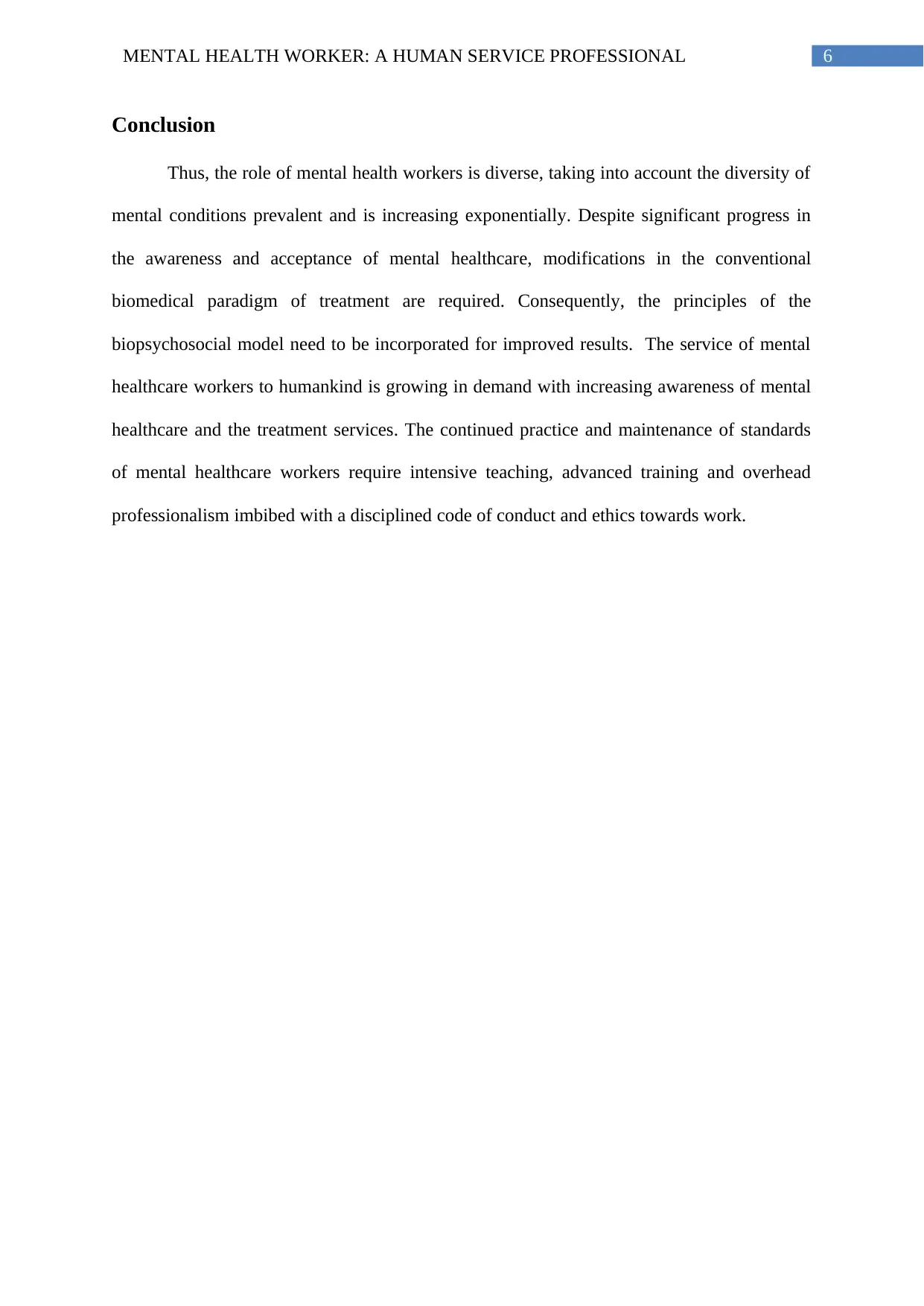
6MENTAL HEALTH WORKER: A HUMAN SERVICE PROFESSIONAL
Conclusion
Thus, the role of mental health workers is diverse, taking into account the diversity of
mental conditions prevalent and is increasing exponentially. Despite significant progress in
the awareness and acceptance of mental healthcare, modifications in the conventional
biomedical paradigm of treatment are required. Consequently, the principles of the
biopsychosocial model need to be incorporated for improved results. The service of mental
healthcare workers to humankind is growing in demand with increasing awareness of mental
healthcare and the treatment services. The continued practice and maintenance of standards
of mental healthcare workers require intensive teaching, advanced training and overhead
professionalism imbibed with a disciplined code of conduct and ethics towards work.
Conclusion
Thus, the role of mental health workers is diverse, taking into account the diversity of
mental conditions prevalent and is increasing exponentially. Despite significant progress in
the awareness and acceptance of mental healthcare, modifications in the conventional
biomedical paradigm of treatment are required. Consequently, the principles of the
biopsychosocial model need to be incorporated for improved results. The service of mental
healthcare workers to humankind is growing in demand with increasing awareness of mental
healthcare and the treatment services. The continued practice and maintenance of standards
of mental healthcare workers require intensive teaching, advanced training and overhead
professionalism imbibed with a disciplined code of conduct and ethics towards work.
Paraphrase This Document
Need a fresh take? Get an instant paraphrase of this document with our AI Paraphraser
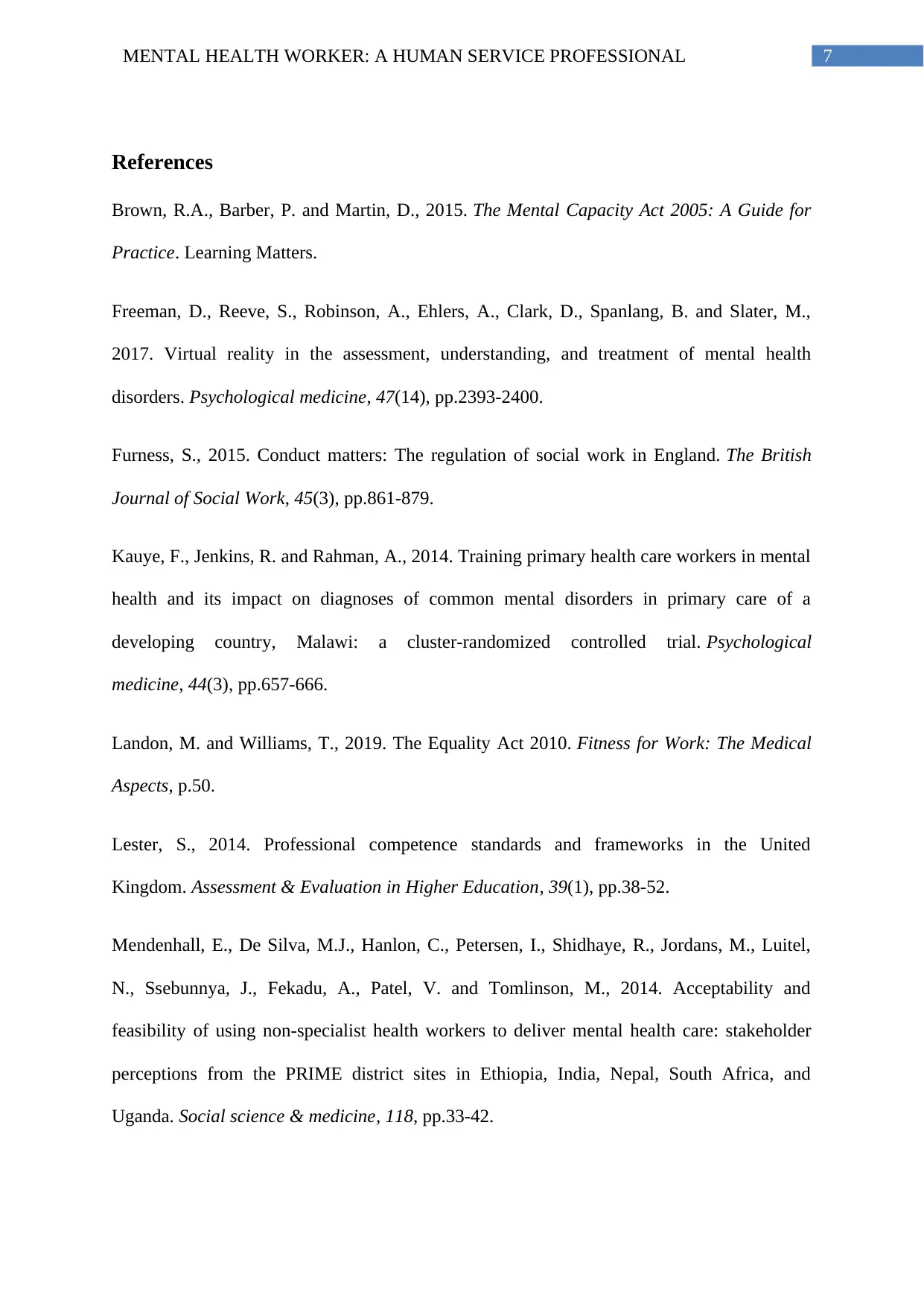
7MENTAL HEALTH WORKER: A HUMAN SERVICE PROFESSIONAL
References
Brown, R.A., Barber, P. and Martin, D., 2015. The Mental Capacity Act 2005: A Guide for
Practice. Learning Matters.
Freeman, D., Reeve, S., Robinson, A., Ehlers, A., Clark, D., Spanlang, B. and Slater, M.,
2017. Virtual reality in the assessment, understanding, and treatment of mental health
disorders. Psychological medicine, 47(14), pp.2393-2400.
Furness, S., 2015. Conduct matters: The regulation of social work in England. The British
Journal of Social Work, 45(3), pp.861-879.
Kauye, F., Jenkins, R. and Rahman, A., 2014. Training primary health care workers in mental
health and its impact on diagnoses of common mental disorders in primary care of a
developing country, Malawi: a cluster-randomized controlled trial. Psychological
medicine, 44(3), pp.657-666.
Landon, M. and Williams, T., 2019. The Equality Act 2010. Fitness for Work: The Medical
Aspects, p.50.
Lester, S., 2014. Professional competence standards and frameworks in the United
Kingdom. Assessment & Evaluation in Higher Education, 39(1), pp.38-52.
Mendenhall, E., De Silva, M.J., Hanlon, C., Petersen, I., Shidhaye, R., Jordans, M., Luitel,
N., Ssebunnya, J., Fekadu, A., Patel, V. and Tomlinson, M., 2014. Acceptability and
feasibility of using non-specialist health workers to deliver mental health care: stakeholder
perceptions from the PRIME district sites in Ethiopia, India, Nepal, South Africa, and
Uganda. Social science & medicine, 118, pp.33-42.
References
Brown, R.A., Barber, P. and Martin, D., 2015. The Mental Capacity Act 2005: A Guide for
Practice. Learning Matters.
Freeman, D., Reeve, S., Robinson, A., Ehlers, A., Clark, D., Spanlang, B. and Slater, M.,
2017. Virtual reality in the assessment, understanding, and treatment of mental health
disorders. Psychological medicine, 47(14), pp.2393-2400.
Furness, S., 2015. Conduct matters: The regulation of social work in England. The British
Journal of Social Work, 45(3), pp.861-879.
Kauye, F., Jenkins, R. and Rahman, A., 2014. Training primary health care workers in mental
health and its impact on diagnoses of common mental disorders in primary care of a
developing country, Malawi: a cluster-randomized controlled trial. Psychological
medicine, 44(3), pp.657-666.
Landon, M. and Williams, T., 2019. The Equality Act 2010. Fitness for Work: The Medical
Aspects, p.50.
Lester, S., 2014. Professional competence standards and frameworks in the United
Kingdom. Assessment & Evaluation in Higher Education, 39(1), pp.38-52.
Mendenhall, E., De Silva, M.J., Hanlon, C., Petersen, I., Shidhaye, R., Jordans, M., Luitel,
N., Ssebunnya, J., Fekadu, A., Patel, V. and Tomlinson, M., 2014. Acceptability and
feasibility of using non-specialist health workers to deliver mental health care: stakeholder
perceptions from the PRIME district sites in Ethiopia, India, Nepal, South Africa, and
Uganda. Social science & medicine, 118, pp.33-42.

8MENTAL HEALTH WORKER: A HUMAN SERVICE PROFESSIONAL
Thomas, F., Hansford, L., Ford, J., Wyatt, K., McCabe, R. and Byng, R., 2018. Moral
narratives and mental health: rethinking understandings of distress and healthcare support in
contexts of austerity and welfare reform. Palgrave Communications, 4(1), pp.1-8.
Thomas, F., Hansford, L., Ford, J., Wyatt, K., McCabe, R. and Byng, R., 2018. Moral
narratives and mental health: rethinking understandings of distress and healthcare support in
contexts of austerity and welfare reform. Palgrave Communications, 4(1), pp.1-8.
⊘ This is a preview!⊘
Do you want full access?
Subscribe today to unlock all pages.

Trusted by 1+ million students worldwide
1 out of 9
Related Documents
Your All-in-One AI-Powered Toolkit for Academic Success.
+13062052269
info@desklib.com
Available 24*7 on WhatsApp / Email
![[object Object]](/_next/static/media/star-bottom.7253800d.svg)
Unlock your academic potential
Copyright © 2020–2026 A2Z Services. All Rights Reserved. Developed and managed by ZUCOL.





